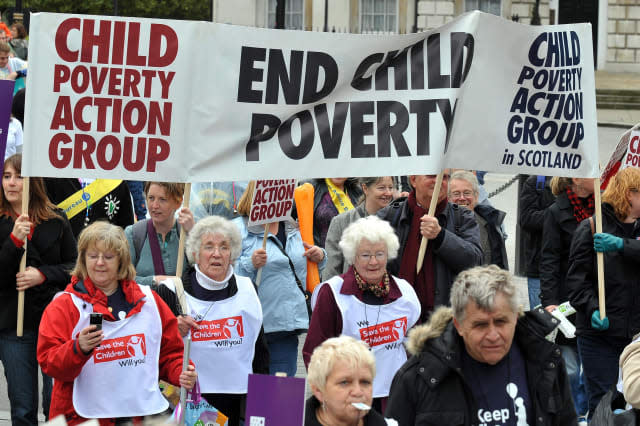Child poverty 'lowest since 1980s'

Figures the Government said showed 2.3 million children were classed as living in relative poverty, the lowest level since the 1980s, have sparked controversy.
The Department for Work and Pensions said the percentage of children in relative low-income households remained "flat" in 2013/14 despite speculation that the figure would increase to 2.5 million.
The current definition of child poverty is whether a child lives in a household with an income less than 60% of the national average.
Work and Pensions Secretary Iain Duncan Smith said: "These statistics show that the proportion of individuals with low income is now at the lowest level since the mid-1980s."
But unions, campaign groups and opposition politicians questioned the Government's view, amid warnings that the country faced a "child poverty crisis".
Labour MP Frank Field, who chairs the Work and Pensions Select Committee, said: "Politicians might understand these measurements but the electorate certainly doesn't. What I hope would interest the electorate is action to prevent poor children becoming poor adults.
"We must therefore begin talking about, and measuring, poor children's life chances and how they can be improved. It is important that such measurements are accurate, but that they can also safely drive anti-poverty policy."
Mr Duncan Smith said: "We know that work is the best route out of poverty, with children in workless families around three times as likely to be in poverty than those in working families. That is why, as part of our long-term economic plan, our reforms to the welfare system are focused on making work pay, while our reforms to the tax system are allowing people to keep more of what they earn.
"Latest figures show UK employment has reached an all-time high, with employment up more than two million since 2010, and the number of households where no one works is the lowest since records began."
The DWP said that in 2013/14, the average real terms household income before housing costs (BHC) remained unchanged from 2012/13 at £453 a week.
Average household income after housing costs was also unchanged at £386, said the department.
The latest figures showed 9.6 million individuals in relative low income.
The percentage of children in relative low income BHC remained flat at 17%, its lowest level since 1980s, said the DWP.
The figures saw a general decrease between 2007/8 and 2010/11 and have remained broadly stable to 2013/14, the department added.
Javed Khan, chief executive of children's charity Barnardo's, said: "Poverty is blighting the life chances of our children, making them more likely to fall sick, do less well at school and be unemployed in the future."
TUC general secretary Frances O'Grady said: "Despite the headline employment rate returning to its pre-recession level, absolute poverty rates are still higher.
"The extreme cuts to tax credits the Government is planning for working families will do nothing to raise wages and will leave low-paid families even worse off. There's a big danger this will start poverty rates rising again."
Campbell Robb, chief executive of Shelter, said: "It's shocking to see hard evidence of families starting to sink rather than swim, as they deal with the double blow of welfare cuts and sky high housing costs."
Alison Garnham, chief executive of the Child Poverty Action Group, said: "These figures make grim reading for anyone looking for progress on child poverty. Because, make no mistake, we are facing a child poverty crisis in the years ahead and the Government is not going to meet the child poverty targets it signed up to.
"On the Government's preferred absolute poverty measure, there are half a million more children in poverty than there were in 2010."
Chris Leslie, shadow chancellor, said: "These statistics show a depressing lack of progress we should be making as a country towards the abolition of child poverty in the UK.
"The Government needs a serious strategy to address low pay and boost productivity, rather than 'redefining' the child poverty statistics and pretending the problem has just gone away.
"A plan to reduce child poverty is needed now, rather than threats to cut £5 billion from tax credits which would mean 3.7 million working families losing, on average, £1,400 a year. That will not address child poverty – it will add to it."
Prime Minister David Cameron's official spokeswoman said: "What today's statistics show is that the proportion of individuals in poverty is at the lowest level since the mid-1980s.
"The Prime Minister... remains committed to doing more work to eliminate child poverty and that is precisely why the Government wants to look at having an approach that is focused more on tackling the root causes of poverty than treating the symptoms."
Dr Mary Bousted, general secretary of the Association of Teachers and Lecturers, said:
"The Government's failure to cut the number of children living in poverty in the UK is shameful. With 2.3 million children living in poverty in the UK, a new generation of children is getting used to food banks."





